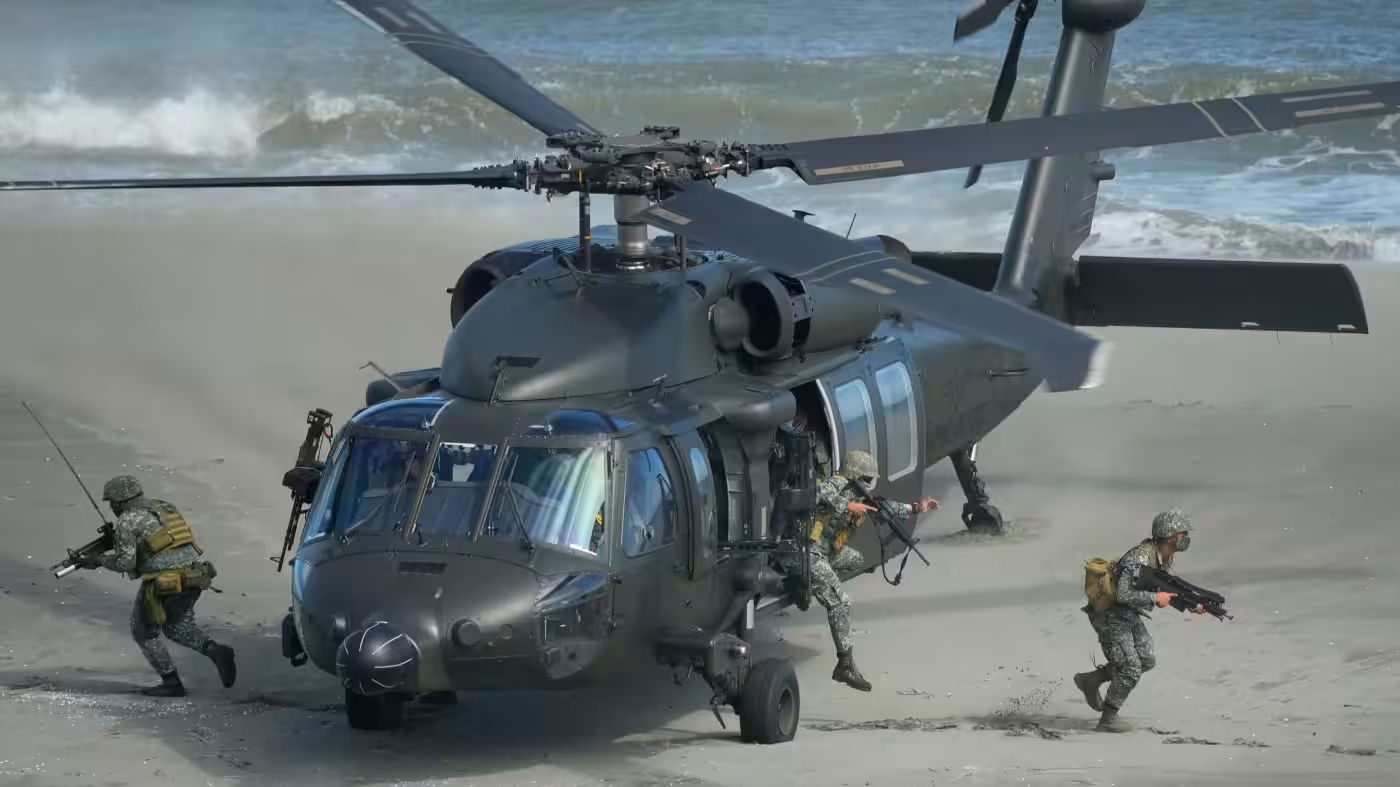Philippines and U.S. to ‘sink’ ships in South China Sea drills
May 7, 2024 · By RAMON ROYANDOYAN, Nikkei staff writer for asia.nikkei.com

Filipino Marines alight at a beach in the northern province of Cagayan on March 31, 2022, during the annual Balikatan exercises with the U.S. © AP
Philippines and U.S. to ‘sink’ ships in South China Sea drills
MANILA — Filipino and American forces will conduct their annual joint military exercises next week, including simulations of sinking ships, which likely will irk China amid flaring tensions in the South China Sea.
These activities, along with a joint sail with a small French contingent within the Philippines’ exclusive economic zone, will headline what are expected to be the country’s largest-ever joint drills.
The annual exercises, named Balikatan, which means “shoulder to shoulder” in Filipino, began in 1991 and are part of a broader commitment between the Philippines and the U.S. to boost defense cooperation in the face of countering China’s expanding influence and aggression within the region, after the South China Sea and the Taiwan Strait emerged as two flashpoints for tensions in recent months.
The drills, starting on Monday and lasting till May 10, will focus on strengthening interoperability between the two countries’ forces. “It is to demonstrate appalling combat readiness, but also interoperability we’re dealing with,” Col. Michael Logico, who oversees the joint exercises, told reporters. “We’re talking about two armed forces which have different organizations, different cultures, different capabilities and different processes for command and control. And you intend to train to a level that you can fight together.”
Notably, the Philippines has gradually shifted its approach to focus on external defense, anchored by the Marcos administration’s push for a comprehensive archipelagic defense concept. This strategy is underpinned by a need to address the country’s maritime disputes with China and was recently reiterated by defense chief Gilbert Teodoro, who said the Philippines “needs to bolster its maritime and air capabilities.”
The Balikatan exercises this year will involve a total of some 16,700 soldiers from the Philippines and the U.S., featuring training in maritime security, air and missile defense, dynamic missile strikes, cyberdefense and information operations.
“We are going to have a maritime strike. It’s going to be a sinking exercise,” Logico said. “We will be sinking a decommissioned Philippine Navy vessel off of the coast of Laoag,” a city in the northern Ilocos province where last year’s exercises sank a mock enemy warship.
Ever since Philippine President Ferdinand Marcos Jr. was elected in 2022, Manila’s policies have grown closer to Washington, in contrast to his predecessor, Rodrigo Duterte, who preferred Beijing’s influence.
This layer of “advanced cooperation” figured in the joint statement released by the U.S., Japan and the Philippines at their historic trilateral summit in early April. The summit showcased a united front against China’s influence as the three nations condemned Beijing’s naked aggression in the disputed waterways.
Similarly, other nations rallied around Manila’s cause in the disputed maritime area by joining the Southeast Asian nation’s naval drills, as seen in the April 7 joint sail with the U.S., Japan and Australia. Toward the end of 2023, the Philippines and the U.S. held aerial drills over the South China Sea.
Experts reckoned these joint exercises will showcase the solidarity between like-minded partners in the region. “While exercises alone will not deter China, they add a vital element in enhancing maritime security cooperation amid emerging challenges,” said Don McLain Gill, an analyst and lecturer at De La Salle University in Manila.
The Philippine Coast Guard will be joining the Balikatan exercises for the first time, and Dindo Manhit, president of the Manila-based think tank Stratbase ADR Institute, said he sees value in the Philippines’ “whole-of-society” approach in dealing with maritime disputes.
In his view, particular segments of the joint drills could also serve as deterrents against Chinese actions.
“The decision to simulate sinking ships and retaking islands could be perceived by China as provocative, potentially escalating tensions rather than deterring them,” he said. “It is crucial to acknowledge that these exercises demonstrate a long-lasting commitment to defending Philippine sovereignty.”
China continues to ignore warnings in igniting maritime tensions through actions such as when Beijing’s patrols repeatedly used water cannons to disrupt Manila’s resupply missions to its outposts.
Around 14 nations are expected to join as observers in the drills, including Japan, India and countries in ASEAN and Europe.
Ahead of the joint drills, Beijing took a swipe at the Philippines on Monday, saying that its move to “flex muscles and stoke confrontation” will heat up tensions and that “to hand over one’s security to forces outside the region will only lead to greater insecurity and turn oneself into someone else’s chess piece.”
Julio Amador, CEO of Amador Research Services in the Philippines, told Nikkei Asia that the drills are also “significant” for Southeast Asia because “the strengthened alliance provides an indirect security umbrella, which will account for ASEAN’s demand for more U.S. presence.”
He added: “The capacity building it provides to the Philippine military is critical on its own. The ability to work with the U.S. military and other partner countries is also crucial for any contingencies.”
“In a parallel universe where China did not exist,” Logico said, “we would still be doing these exercises, because these are things that nations do.”
Additional reporting by Ella Hermonio.






